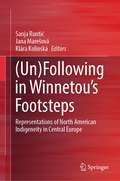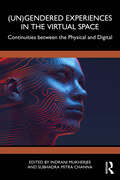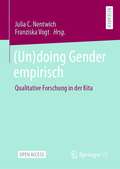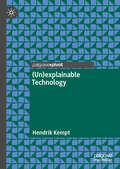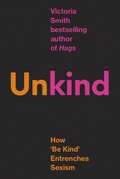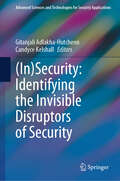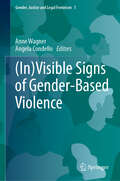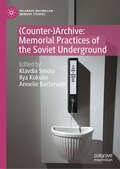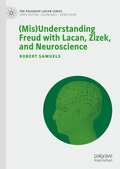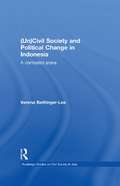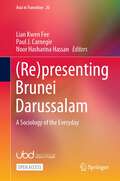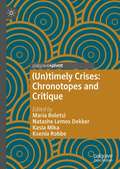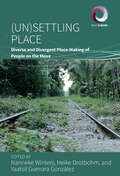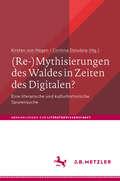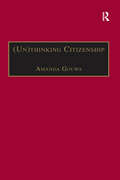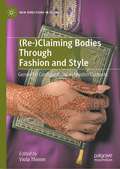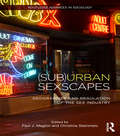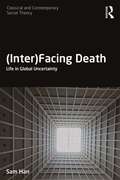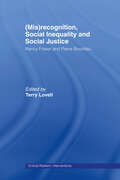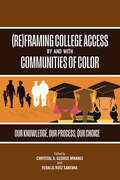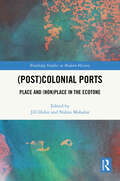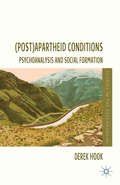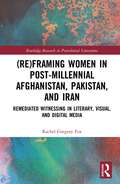- Table View
- List View
(Un)Following in Winnetou’s Footsteps: Representations of North American Indigeneity in Central Europe
by Sanja Runtić Jana Marešová Klára KolinskáThis book examines the ways in which North American Indigenous identity has been (re)imagined, represented, and negotiated in German, Croatian, Italian, Polish, and Czech culture. Employing a cross-disciplinary and comparative approach and drawing on a range of media—from literature, comics, and film to photography, painting, and the performative arts—across different historical and cultural backgrounds, it aims to both contribute innovative scholarship on Indigenous studies in Europe and open a new avenue in the field by focusing on Central European settings that have received little or no critical attention to date. The book’s novelty also comes from its focus on the latest developments in the field, including the “Ravensburger/Winnetou controversy,” which swept across Europe in 2022, echoing the 2017 Canadian debate over Indigenous appropriation and free speech. It seeks to provide a sound reference and lay the groundwork for future scholarship by opening up a conversation on how Indigenous identities have been portrayed in Central European literature and media texts. To this end, it not only addresses generalized expectations about North American Indigenous people underlying (Central) European public discourse and imagination but also questions whether and to what extent some of the ingrained stereotypical views and practices, such as hobbyism, have been challenged in the face of Indigenous resurgence, rapidly changing media and information-sharing realities, and global cultural shifts. The closing interview with Métis playwright, actor, and director Bruce Sinclair underscores one of the book’s key goals—to spark an informed cross-cultural dialogue that will reveal the mechanisms of, as well as the contradictions and tensions inherent in, the politics of Indigenous representation in (Central) European cultural industries and encourage (Central) Europeans to confront their own cultural assumptions and attitudes.
(Un)Gendered Experiences in the Virtual Space: Continuities between the Physical and Digital
by Subhadra Mitra Channa Indrani MukherjeeThis book critically examines the ever-evolving relationship between gender, identity and technology, investigating how identity is shaped, expressed, and contested within virtual environments.It brings together empirical essays from various geographies including Israel, Italy, South Africa, Spain, Brazil, and India, to explore how gender constructs, religiosity, social support structures, ethical discourses, biases and toxicity weave into the digital fabric. While the digital space can build community and open up liberating possibilities, it also retains echoes of real-world social and gender dynamics. The absence of the physical body does not shield virtual spaces from deeply entrenched socio-cultural and political contexts. Through an exploration of different virtual platforms and digital apps like Facebook, WhatsApp, and Tinder among others, the book invites readers to contemplate the boundless possibilities and pressing challenges that arise when gendered experiences converge with the infinite expanse of the virtual space(s). The chapters in this volume offer great analytical insights into these dynamics supported by well-surmised theoretical and methodological backdrops.The book will be of interest to practitioners of social sciences, especially those interested in issues of gender and identity politics as well as research in the digital or virtual space. It will also be a valuable resource for students and researchers of anthropology and sociology.
(Un)doing Gender empirisch: Qualitative Forschung in der Kita
by Julia C. Nentwich Franziska VogtIn diesem Open-Access-Sammelband wird angehenden und fortgeschrittenen Forschenden aufgezeigt, wie «doing» und «undoing gender» in Institutionen der frühen Kindheit erforscht und analysiert werden können.Thematisiert werden:zentrale theoretische Konzeptionen von doing und undoing gender verschiedener sozialwissenschaftlicher Theorietraditionenein multimethodischer und multiperspektivischer Ansatz zur empirischen Untersuchung mit qualitativ-ethnographischen ForschungsmethodenVielfältige analytische Zugänge: Raumanalyse, Sequenzanalyse, Dokumentenanalyse, sozialwissenschaftlich hermeneutische Analyse, Diskursanalyse, Analyse organisationaler PraktikenErziehungswissenschaftliche und sozialpsychologische Perspektiven auf Kindertagesstätten als Arbeitsplatz und Organisation, Raum- und Spielangebote, Organisationsentwicklung und eine genderreflektierte Pädagogik
(Un)explainable Technology
by Hendrik KemptThis book explores the issue of (un)explainable technology. As we face technologies, mostly autonomous, machine-learned algorithms (AI) that elude a seamless explanation on how they work (“black boxes”), several issues both from an epistemological as well as ethical perspectives emerge. It is thus not surprising that there are plenty of technological attempts in illuminating the black box as well as philosophical efforts in conceptualizing and re- assessing our concepts of an explanation and understanding, as well emerging ethical questions on how to deal with this unexplainable technology. This book thus offers a succinct and comprehensive, opinionated but fair view on the emerging ethical debate on explainability of AI and its relevance for using AI for different more or less sensitive decision-making procedures. As a short book, the goal is to introduce the reader to the issues at hand while also offering normative arguments from different sides that motivate, complicate, and resolve these issues.
(Un)kind: How 'Be Kind' Entrenches Sexism
by Victoria Smith'Victoria Smith is a brilliant writer who every feminist should read' Sharron Davies'This brilliant book shows how demands for compassion and generosity can be a mask for sexist ideology' Susanna RustinA brilliantly witty and insightful analysis of how kindness culture is used against women. Using the #JustBeKind trend of the 2020s as a starting point, (Un)kind explores how traditional beliefs about women's 'kind' nature have been repackaged for an age that remains dependent - socially, politically, economically - on female self-sacrifice while finding the concept outdated and essentialist. Looking at the various guises under which kindness culture is sold to women and girls - from play to self-help, social justice activism to empowerment - Victoria Smith argues that the pressure on women and girls has not decreased, but instead been incorporated into the 'work' of feminism. (Un)kind analyses the way in which this phenomenon ultimately distorts relationships, harming not just those coerced into performing 'kindness work' but the supposed recipients of their services.Kindness culture supports the backlash against feminism while claiming to represent feminism's - and women's - true nature. It is, at heart, unkind.'Erudite, blisteringly smart and profoundly compassionate... A must-read for anyone hungry to understand the origins and dangers of contemporary exhortations to women to #BeKind, and for everyone who wants to live a feminist life' Dr Rachel HewittPRAISE FOR HAGS'The greatest joy of Hags is its lively erudition . . . eloquent, clever and devastating' The Times 'A book that could not be more necessary' Observer 'Brilliantly witty, engaging and insightful' Scotsman
(Un)kind: How 'Be Kind' Entrenches Sexism
by Victoria Smith'Victoria Smith is a brilliant writer who every feminist should read' Sharron Davies'This brilliant book shows how demands for compassion and generosity can be a mask for sexist ideology' Susanna RustinA brilliantly witty and insightful analysis of how kindness culture is used against women. Using the #JustBeKind trend of the 2020s as a starting point, (Un)kind explores how traditional beliefs about women's 'kind' nature have been repackaged for an age that remains dependent - socially, politically, economically - on female self-sacrifice while finding the concept outdated and essentialist. Looking at the various guises under which kindness culture is sold to women and girls - from play to self-help, social justice activism to empowerment - Victoria Smith argues that the pressure on women and girls has not decreased, but instead been incorporated into the 'work' of feminism. (Un)kind analyses the way in which this phenomenon ultimately distorts relationships, harming not just those coerced into performing 'kindness work' but the supposed recipients of their services.Kindness culture supports the backlash against feminism while claiming to represent feminism's - and women's - true nature. It is, at heart, unkind.'Erudite, blisteringly smart and profoundly compassionate... A must-read for anyone hungry to understand the origins and dangers of contemporary exhortations to women to #BeKind, and for everyone who wants to live a feminist life' Dr Rachel HewittPRAISE FOR HAGS'The greatest joy of Hags is its lively erudition . . . eloquent, clever and devastating' The Times 'A book that could not be more necessary' Observer 'Brilliantly witty, engaging and insightful' Scotsman
**Missing** (Advanced Sciences and Technologies for Security Applications)
by Gitanjali Adlakha-Hutcheon Candyce KelshallWhat does it take to disrupt security? How does one disrupt the invisibility of insecurity? How does one make the invisible factors that define and impact security visible? For a start, by giving voice to the unheard and the marginalized, engaging non-traditional understandings of security that might bring to light the cracks in our current security infrastructure and expose the insecurities that are hidden in plain sight. These voices include generational, geographic, cultural, ethnic, and gender-based perspectives of insecurity which are ignored, or simply cannot be heard, by traditional notions of security. Presently there is a lack of understanding of the language of nuanced hate being whispered from the ground that inform civil discord. These call for new intrastate actions that need to be taken to make communities safer and building layers of protective resilience into the continuing existence of the state. Unresolved grievances lay the foundation for insecurity and instability for the future at a time when states need cohesiveness more than ever and there are significant invisible insecurities, external to the state, that need to be revealed. The tapestry of interrelationships that enable security within a state requires equity, access, and agency among communities. If we are to achieve this, we must learn to see the invisible, listen to the unheard, and move beyond our static conceptions of security. In so doing we build more resilient societies in the face of a dynamic threat environment and ensure the peaceful continued existence of states. This book is a sounding board for positive disruption, a source for alternative theories, tools, and models to aid mitigation of the whispered threats and the soft violence which accompanies chauvinism of any one way of being. In this edited book the multiplicity of factors that impact security is explored through new lenses to glean insights, such that we are better equipped to prevent harm and protect our security.
**Missing** (Gender, Justice and Legal Feminism #1)
by Anne Wagner Angela CondelloThe edited volume explores the causes, forms, and cultures of gender-based violence in society, including how children are educated, how games, art and even language promote differences, stereotypes, neutrality between men and women. It is a place to reflect on the growing importance of tolerance, diversity and acceptance of others. The book focuses on many facets, whether in a confined or public space, with a series of empirical and theoretical chapters from around the world. The volume provides key contemporary commentary on the changing dynamics of gender-based violence. It unveils a range of contexts and spaces in which gender-based violence happens, showcasing its scale and impact worldwide. The discussions presented in the book encourage a critical reflection on the global pandemic of gender-based violence, prompting a vital question about the sufficiency and effectiveness of responses to this global crisis (Professor Olga Jurasz, The Open University Law School).
**Missing** (Palgrave Macmillan Memory Studies)
by Klavdia Smola Ilya Kukulin Annelie BachmaierThis book is the first major study exploring archival and memorial practices of the Soviet unofficial culture. The creation of counter-archives was one of the most important forms of cultural resistance in the Soviet Union. Unofficial artists and poets had to reinvent the possibilities of maintaining art and literature that “did not exist”. Against the background of archival theories and memory studies, the volume explores how the culture of the Soviet underground has become one of the most striking cases of scholarly and artistic (self-)archiving, which – although being half-isolated from the outer world – reflected intellectual and artistic trends characteristic of its time. The guiding question of the volume is how Soviet unofficial culture (de)constructed social memory by collecting, archiving and memorizing tabooed culture of the past and present.
**Missing** (The Palgrave Lacan Series)
by Robert SamuelsThis book sets out to clarify five key Freudian concepts (the pleasure principle, the primary processes, the unconscious, transference, and the reality principle) elaborated early on in Freud’s work but, it is argued, rarely understood—even by psychoanalysts themselves. It examines in turn the post-Freudian paradigms employed in neuropsychoanalysis, Lacan, Zizek, object relations, and psychoanalytic approaches to identity politics, and in doing so reveals the extent to which they have been distorted and repressed in these new contexts. Over the course of the book the author demonstrates how Freud’s unpublished Project for a Scientific Psychology can be seen as a complete system of core concepts that both ground psychoanalysis in neurology and also introduce a vital challenge to the brain sciences. This book will appeal to students and scholars of psychoanalysis, clinical psychology, and psychoanalytic theory.
**Missing**: A Contested Arena (Routledge Studies on Civil Society in Asia)
by Verena Beittinger-Lee(Un) Civil Society and Political Change in Indonesia provides critical analysis of Indonesia’s civil society and its impact on the country’s democratization efforts that does not only take the classical, pro-democratic actors of civil society into account but also portrays uncivil groups and their growing influence on political processes. Beittinger-Lee offers a revised categorization of civil society, including a model to define the sphere of ‘uncivil society’ more closely and to identify several subcategories of uncivil society. This is the first book to portrays various uncivil groups in Indonesia, ranging from vigilantes, militias, paramilitaries, youth groups, civil security task forces and militant Islamic (and other religious) groups, ethnonationalist groups to terrorist organizations and groups belonging to organized crime. Moreover, it provides the reader with an overview of Indonesia’s history, its political developments after the democratic opening, main improvements under the various presidents since Suharto’s fall, constitutional amendments and key reforms in human rights legislation. This book will be of interest to upper level undergraduates, postgraduates and academics in political science and Southeast Asian studies.
**Missing**: A Sociology of the Everyday (Asia in Transition #20)
by Noor Hasharina Hassan Paul J. Carnegie Lian Kwen FeeThis thoughtful and wide-ranging open access volume explores the forces and issues shaping and defining contemporary identities and everyday life in Brunei Darussalam. It is a subject that until now has received comparatively limited attention from mainstream social scientists working on Southeast Asian societies. The volume helps remedy that deficit by detailing the ways in which religion, gender, place, ethnicity, nation-state formation, migration and economic activity work their way into and reflect in the lives of ordinary Bruneians. In a first of its kind, all the lead authors of the chapter contributions are local Bruneian scholars, and the editors skilfully bring the study of Brunei into the fold of the sociology of everyday life from multiple disciplinary directions. By engaging local scholars to document everyday concerns that matter to them, the volume presents a collage of distinct but interrelated case studies that have been previously undocumented or relatively underappreciated. These interior portrayals render new angles of vision, scale and nuance to our understandings of Brunei often overlooked by mainstream inquiry. Each in its own way speaks to how structures and institutions express themselves through complex processes to influence the lives of inhabitants. Academic scholars, university students and others interested in the study of contemporary Brunei Darussalam will find this volume an invaluable resource for unravelling its diversity and textures. At the same time, it hopefully stimulates critical reflection on positionality, hierarchies of knowledge production, cultural diversity and the ways in which we approach the social science study of Brunei. ‘I wish to commend the editors for bringing this volume to fruition. It is an important book in the context of Southeast Asian sociology and even more important for the development of our social, geographical, cultural and historical knowledge of Brunei.’ —Victor T. King, University of Leeds
**Missing**: Chronotopes and Critique (Palgrave Studies in Globalization, Culture and Society)
by Maria Boletsi Kasia Mika Ksenia Robbe Natashe Lemos DekkerUn)timely Crises explores how ‘crisis’—as a narrative, concept, grammar, and experience—structures time and space. This collectively written volume extends Bakhtin’s ‘chronotope’ to challenge mobilizations of crisis within neoliberal governmentality. The book explores how contemporary crises can trigger memories and traumas of earlier events as well as foster practices of resistance and alternative visions of the future. Drawing from across disciplines and geographical contexts, (Un)timely Crises reimagines the relation of ‘crisis’ with ‘critique’, proposing future trajectories for thinking and living in and through crisis.
**Missing**: Diverse and Divergent Place-Making of People on the Move (Worlds in Motion #14)
by Nanneke Winters, Heike Drotbohm and Yaatsil Guevara GonzálezPeople who are “on the move,” particularly migrants and the displaced, often inhabit places that are considered temporary, peripheral, and remote. (Un)Settling Place recentralizes these “out-of-the-way” places as key sites in the shaping of people’s mobility and identities. Ranging from the surveillance and care that migrants experience to the re-creation of social ties and the re-claiming of space, this collection volume seeks to show how a critical approach to in-between place-making can challenge the idea of place as fixed, singular, or one-directional, offering new ways of understanding migrant trajectories.
**Missing**: Eine literarische und kulturhistorische Spurensuche (Abhandlungen zur Literaturwissenschaft)
by Corinna Dziudzia Kirsten Von HagenAktuell ist Wald in öffentlichen Diskursen zentral, verbunden mit einer Re-Mythisierung, die zum einen als Effekt einer ökologisch bedingten Krise und zum anderen als Folge einer Primordialität des Digitalen zu lesen ist. Wald ist Anti-Digitalität, weil umfassend sinnlich erfahrbar. Umso mehr sich gerade das Buch in seiner Materialität vom Wald als rohstoffliefernder Grundlage entfernt, wird der Wald Thema in Ecocriticism, Kulturökologie und Nature Writing. Doch der Wald hat immer schon zahlreiche Mythisierungen erfahren, als Schutz- und Inspirationsort ebenso wie als Denkfigur lassen sich zahlreiche Inszenierungsformen beobachten, die von Dante bis zu aktuellen Serien, Filmen und Comics führen. In den nun versammelten Beiträgen einer neuen nachhaltigen Form von Online-Studientagen wird der Ubiquität des Waldes aus einer interdisziplinären Perspektive nachgespürt.
**Missing**: Einstellungen zu Migranten in Deutschland und Europa (Blickpunkt Gesellschaft)
by Pascal Siegers Sonja Schulz Oshrat Hochman Bettina WestleDieser Band versammelt verschiedene Untersuchungen zu Einstellungen zu Migranten und zu nationalistischem Wahlverhalten, die alle auf repräsentativen Bevölkerungsumfragen beruhen. Insgesamt verdeutlicht die Gesamtschau der in diesem Band versammelten Beiträge die Bedeutsamkeit von (positiven) Kontakten zwischen der deutschen Aufnahmegesellschaft und der Migrantenpopulation. Hinweise auf eine allgemeine Verschlechterung des Meinungsklimas gegenüber ethnischen Minderheiten ergeben sich aus den Studien nicht. Sofern Migration nicht als Bedrohung für den eigenen Status wahrgenommen wird, kann verstärkter Kontakt dazu führen, dass die deutsche Bevölkerung insgesamt toleranter und offener wird. Im Gegenschluss kann eine wahrgenommene Bedrohung des eigenen Status und der eigenen Ressourcen zu einer gesellschaftlichen Polarisierung führen. Der Wandel hin zu einer größeren Akzeptanz Zugewanderter ist also nicht irreversibel: Die „offene Gesellschaft“ in der Bundesrepublik muss ständig aktiv erarbeitet werden.
**Missing**: Feminist Debates in Contemporary South Africa (Gender in a Global/Local World)
by Amanda GouwsThe study of citizenship in the context of South Africa implicitly challenges the rights-based democracy in South Africa, while literature regarding women and citizenship has greatly contributed to a new understanding of citizenship. Locally, many global processes are reproduced in the discourse of rights-claiming, issues of institutional representation, bodily integrity in the face of violence, and care in the face of a lack of care. This volume takes the debate of citizenship in South Africa in a more theoretical and empirical direction while engaging with knowledge produced elsewhere in the world. As part of the Gender in a Local/Global World series, it investigates the making of gendered citizenship, institutionalization of gender politics, the state of gendered policy making, local citizenship, rights, the women's movement, gendered violence, as well as citizenship and the body.
**Missing**: Gendered Configurations in Muslim Contexts (New Directions in Islam)
by Viola ThimmThis book investigates ways of dressing, style and fashion as gendered and embodied, but equally as “religionized” phenomena, particularly focusing on one significant world religion: Islam. Through their clothing, Muslims negotiate concepts and interpretations of Islam and construct their intersectionally interwoven position in the world. Taking the interlinkages between ‘fashionized religion,’ ‘religionized fashion,’ commercialization and processes of feminization as a starting point, this book reshapes our understanding of gendered forms of religiosity and spirituality through the lens of gender and embodiment. Focusing mainly on the agency and creativity of women as they appropriate ways of performing and interpreting various modalities of Muslim clothing and body practices, the book investigates how these social actors deal with empowering conditions as well as restrictive situations. Foregrounding contemporary scholars’ diverse disciplinary, theoretical and methodological approaches, this book problematizes and complicates the discursive and lived interactions and intersections between gender, fashion, spirituality, religion, class, and ethnicity. It will be relevant to a broad audience of researchers across gender, sociology of religion, Islamic and fashion studies.
**Missing**: Geographies and Regulation of the Sex Industry (Routledge Advances in Sociology)
by Paul J. Maginn Christine Steinmetz(Sub)Urban Sexscapes brings together a collection of theoretically-informed and empirically rich case studies from internationally renowned and emerging scholars highlighting the contemporary and historical geographies and regulation of the commercial sex industry. Contributions in this edited volume examine the spatial and regulatory contours of the sex industry from a range of disciplinary perspectives—urban planning, urban geography, urban sociology, and, cultural and media studies—and geographical contexts—Australia, the UK, US and North Africa. In overall terms, (Sub)urban Sexscapes highlights the mainstreaming of commercial sex premises—sex shops, brothels, strip clubs and queer spaces—and products—sex toys, erotic literature and pornography—now being commonplace in night time economy spaces, the high street, suburban shopping centres and the home. In addition, the aesthetics of commercial and alternative sexual practices—BDSM and pornography—permeate the (sub)urban landscape via billboards, newspapers and magazines, television, music videos and the Internet. The role of sex, sexuality and commercialized sex, in contributing to the general character of our cities cannot be ignored. In short, there is a need for policy-makers to be realistic about the historical, contemporary and future presence of the sex industry. Ultimately, the regulation of the sex industry should be informed by evidence as opposed to moral panics. *** Winner of the Planning Institute of Australia (WA) 2015 Award for Excellence in Cutting Edge Research and Teaching ***
**Missing**: Life in Global Uncertainty (Classical and Contemporary Social Theory)
by Sam HanIn modern times, death is understood to have undergone a transformation not unlike religion. Whereas in the past it was out in the open, it now resides mostly in specialized spaces of sequestration—funeral homes, hospitals and other medical facilities. A mainstay in so-called traditional societies in the form of ritual practices, death was usually messy but meaningful, with the questions of what happens to the dead or where they go lying at the heart of traditional culture and religion. In modernity, however, we are said to have effectively sanitized it, embalmed it and packaged it—but it seems that death is back. In the current era marked by economic, political and social uncertainty, we see it on television, on the Internet; we see it almost everywhere. (Inter)Facing Death analyzes the nexus of death and digital culture in the contemporary moment in the context of recent developments in social, cultural and political theory. It argues that death today can be thought of as "interfaced," that is mediated and expressed, in various aspects of contemporary life rather than put to the side or overcome, as many narratives of modernity have suggested. Employing concepts from anthropology, sociology, media studies and communications, (Inter)Facing Death examines diverse phenomena where death and digital culture meet, including art, online suicide pacts, the mourning of celebrity deaths, terrorist beheadings and selfies. Providing new lines of thinking about one of the oldest questions facing the human and social sciences, this book will appeal to scholars and students of social and political theory, anthropology, sociology and cultural and media studies with interests in death.
**Missing**: Nancy Fraser and Pierre Bourdieu (Critical Realism: Interventions (Routledge Critical Realism))
by Nancy Fraser Pierre BourdieuNancy Fraser’s work provides a theory of justice from multiple perspectives which has created a powerful frame for the analysis of political, moral and pragmatic dilemmas in an era of global capitalism and cultural pluralism. It has been developed through dialogue with key contemporary thinkers, including an extended critical exchange with Axel Honneth that touches importantly upon the work of the late Pierre Bourdieu on social suffering. All the essays collected here engage with the work of one or both of these thinkers’. They consider some of the conceptual and philosophical contentions that Fraser’s and Bourdieu’s models have provoked, and offer some compelling examples of their analytical power.
**Missing**: Our Knowledge, Our Process, Our Choice (SUNY series, Critical Race Studies in Education)
by Chrystal A. George Mwangi; Yedalis Ruíz SantanaOffers novel frameworks and models for understanding college access and choice among communities of Color.This much-needed volume brings together academics, practitioners, students, and community members of Color to thoroughly reframe college access and choice in research and practice. Enrollment rates continue to differ substantially by race and ethnicity. While Black, Indigenous, and other People of Color remain inequitably stratified in the pursuit of higher education, many models of college choice are simply insufficient for understanding the college-going processes of diverse students. Continually centering BIPOC knowledge, assets, and needs, contributors provide a series of varied yet connected frameworks grounded in culturally sustaining, community-oriented research. Like the educational journeys it represents, the volume is a communal activity that invites participation. Each chapter concludes with a series of critical reflection questions to guide readers in deeper learning and engagement.
**Missing**: Place and (Non)Place in the Ecotone (Routledge Studies in Modern History)
by Jill Didur Nalini MohabirThis book examines the role of (post)colonial ports in creating and shaping the ecotonal, cultural, historical, material, environmental, socio-political, and economic contexts in formerly colonized regions, spanning the Caribbean, Africa, North America, Europe, and the Pacific.The essays assess the role that literature, visual culture, architecture, archives, and ethnography can play in enriching our understanding of the complex histories of ports and port cities. They present the relation between ports and colonial infrastructure such as immigration checkpoints, detention centers, mines, plantations, shipping containers, canals, sewers, and rivers, and their impact on human and more-than-human environments. The volume approaches (post)colonial ports through the “ecotone,” a concept borrowed from geography and ecology to describe a transition zone where two biological communities meet and mix—such as a forest and a grassland—to bring attention to port (non)spaces as a hinge between their environments, communities, and colonial infrastructure. It foregrounds postcolonial and decolonial approaches to the ecotone to draw attention to the cultural, ecological, and geographical dynamics that inform the social fabric of contemporary ports and port cities in the wake of the empire.This volume is aimed at scholars and postgraduates across disciplines such as literature, geography, fine arts, cultural studies, and history.
**Missing**: Psychoanalysis and Social Formation (Studies in the Psychosocial)
by D. Hook(Post)apartheid Conditions: Psychoanalysis and Social Formation advances a series of psychoanalytic perspectives on contemporary South Africa, exploring key psychosocial topics such as space-identity, social fantasy, the body, whiteness, memory and nostalgia.
**Missing**: Remediated Witnessing in Literary, Visual, and Digital Media (Routledge Research in Postcolonial Literatures)
by Rachel Gregory FoxThis book critically examines the representational politics of women in post-millennial Afghanistan, Pakistan, and Iran across a range of literary, visual, and digital media. Introducing the conceptual model of remediated witnessing, the book contemplates the ways in which meaning is constructed, deconstructed, and reconstructed as a consequence of its (re)production and (re)distribution. In what ways is information reframed? The chapters in this book therefore analyse the reiterative processes via which Afghan, Pakistani, and Iranian women are represented in a range of contemporary media. By considering how Muslim women have been exploited as part of neo-imperial, state, and patriarchal discourses, the book charts possible—and unexpected—routes via which Muslim women might enact resistance. What is more, it asks the reader to consider how they, themselves, embody the role of witness to these resistant subjectivities, and how they might do so responsibly, with empathy and accountability.
